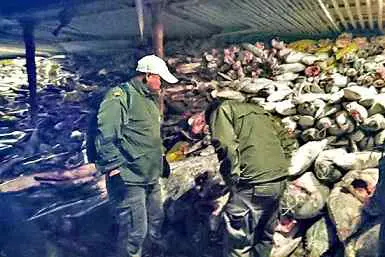Poaching is illegal hunting, killing, capturing or taking of wildlife violating local or international wildlife conservation laws. Animal poaching endangers not only the population of targeted animals but also other animals in their ecosystem, as it often disrupts the essential balance of nature within a healthy biome.
Poaching can cause populations to drastically plummet, ultimately resulting in extinction. The ripple effect can also imperil other flora and fauna existing within the same biome. Humans are the stewards of the natural world. It is our responsibility to protect wild areas and the animal and plant life that live within their boundaries
Healthy ecosystems maintain balanced food chains. Humans are part of this food chain and our species depends upon the health of the natural world for our survival. Every species of the delicate web of life is critical to its proper function and maintenance. Extraction of one species is damaging to this system. According to The Center for Health and Global Environment, a recent study showed that we are on track to lose 30 to 50 percent of all species by mid-century. While this is the result of multiple factors, poaching is one of the primary drivers.
Many human communities depend heavily upon fish as their primary food source. Poaching and overfishing threaten endangered species and can result in species extinction. Furthermore upending the homeostasis of these ecosystems will result in additional species extinctions. This will throw ocean ecosystems out of balance and humans will potentially lose a primary food source.


CITES (Conference of International Trade of Endangered Species) is a critical international event. Not only do we work to add threatened and endangered animals to the Appendices to gain protection from international trade, but we also discuss and strategize anti-poaching efforts. Interpol is a keystone participant in this Conference of the Parties. Additionally, this is a forum where we discuss and budget for new anti-poaching technologies and protocols.
Voice of Cocos Island Cocos Island is one of the final wild places on earth. This is a Costa Rica National Park and a UNESCO World Heritage Site. Our co-founders have been working to protect this island from poaching since the early 1990s. The remote location of this island has protected it from development and pollution, but it presents a formidable challenge for anti-poaching efforts. Out of view, it would only take a few months of unchecked poaching to decimate this natural wonder. The “Voice of Cocos Island” is a publication that encourages and enables national park officials, scientists, SCUBA divers, and island visitors an international platform from which they can communicate their experience and tell the island’s story.
Week in Review – Every week we round up all the latest significant ocean-related news stories and present them together in a concise, digital digest format. This collective, well-vetted publication “The Ocean Week in Review” raises awareness in an increasingly noisy and fast-paced world. We believe informed advocates are best positioned to make a difference.
Advocacy – Call to Action – When we discover responsible agencies that are failing to actively pursue poachers or failing to punish guilty parties to the full extent allowable, we build tools that enable constituents to easily reach out to their representatives and demand action. We rally for passage of protection laws and then monitor that these laws are being carried out.
Sea Save Foundation is a 501 (c) 3 nonprofit organization EIN: 20-0403083. We received the GuideStar Platinum seal of approval in GuideStar’s Exchange program, meaning we have obtained their highest rating for transparency and legitimacy as an organization.



